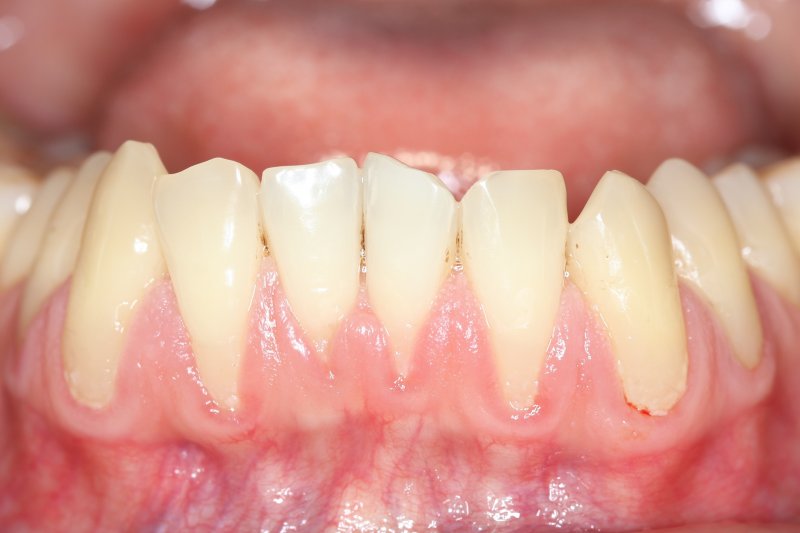
So, let’s say you develop gum disease that makes your gums recede. At least initially, you might believe this symptom is temporary. “After all,” you think, “can’t gums grow back after receding?” The truth, though, is harsher: your body can’t reverse gum recession. As such, fixing the issue requires professional treatment from a local dental practice. To prove these matters, your Lincoln dentist is here with the details. Read on to learn why receded gums don’t re-grow and how dental care can treat them.
What *is* Gum Recession, Anyway?
Gum recession is when the pink tissue surrounding your teeth pulls away. As it does so, the roots of your teeth get exposed and become vulnerable to decay and plaque.
While often the result of gum disease, other causes of gum recession include:
- Aggressive Brushing: Besides wearing down your enamel, over-brushing can damage your gums and make them recede.
- Bruxism (i.e., teeth grinding): When you grind your teeth, the extra force exerted can wear out your gums.
- Genetics: Receding gums can actually “run in the family,” so to speak. If either of your parents has the issue, you’re likely at higher risk.
- Tooth or Gum Injury: If you get a traumatic mouth injury, nearby gum tissue may recede.
Can My Gums Grow Back?
Unfortunately, receded gums have no way of growing back.
You see, recession causes your gum tissue to waste away and decrease in volume. In other words, it makes your gums’ cells destroy themselves. Since your body can’t replace or replenish these cells, you end up losing them for good.
In fact, waiting on your gums to try to “re-grow” will likely make things worse. Left untreated, the factors involved in your recession could also cause tooth decay, cavities, and tooth loss.
Possible Treatments for Gum Recession
Fortunately, dentists have ways of treating receded gums. Once they’ve assessed your condition, they’ll recommend the best procedure for you.
One such treatment might be a deep cleaning. Also called root planing and scaling, this service would clean out bacteria from the pockets between the gums and teeth. In doing so, it’d remove infection and give your gum tissue a chance to heal.
If the receded areas are noticeable, your dentist could also suggest a gum graft. Unlike a deep cleaning, gum grafting would replace your lost tissue with some from another area of your mouth. That way, your smile wouldn’t look “long in the tooth.”
As you can see, gums that recede from gum disease won’t grow back. Therefore, consider the treatments listed above so your teeth get the help they need.
About the Practice
Pioneer Periodontics is based in Lincoln, NE. As led by its talented team of periodontists, our practice strives to give patients the healthiest gums possible. To that end, we offer periodontal therapy, cosmetic periodontics, dental implants, and sedation dentistry. Our office can make all the difference in rescuing your smile using these services! For more information or to book a visit, you can reach us on our website or by phone at (402)-483-7631.
